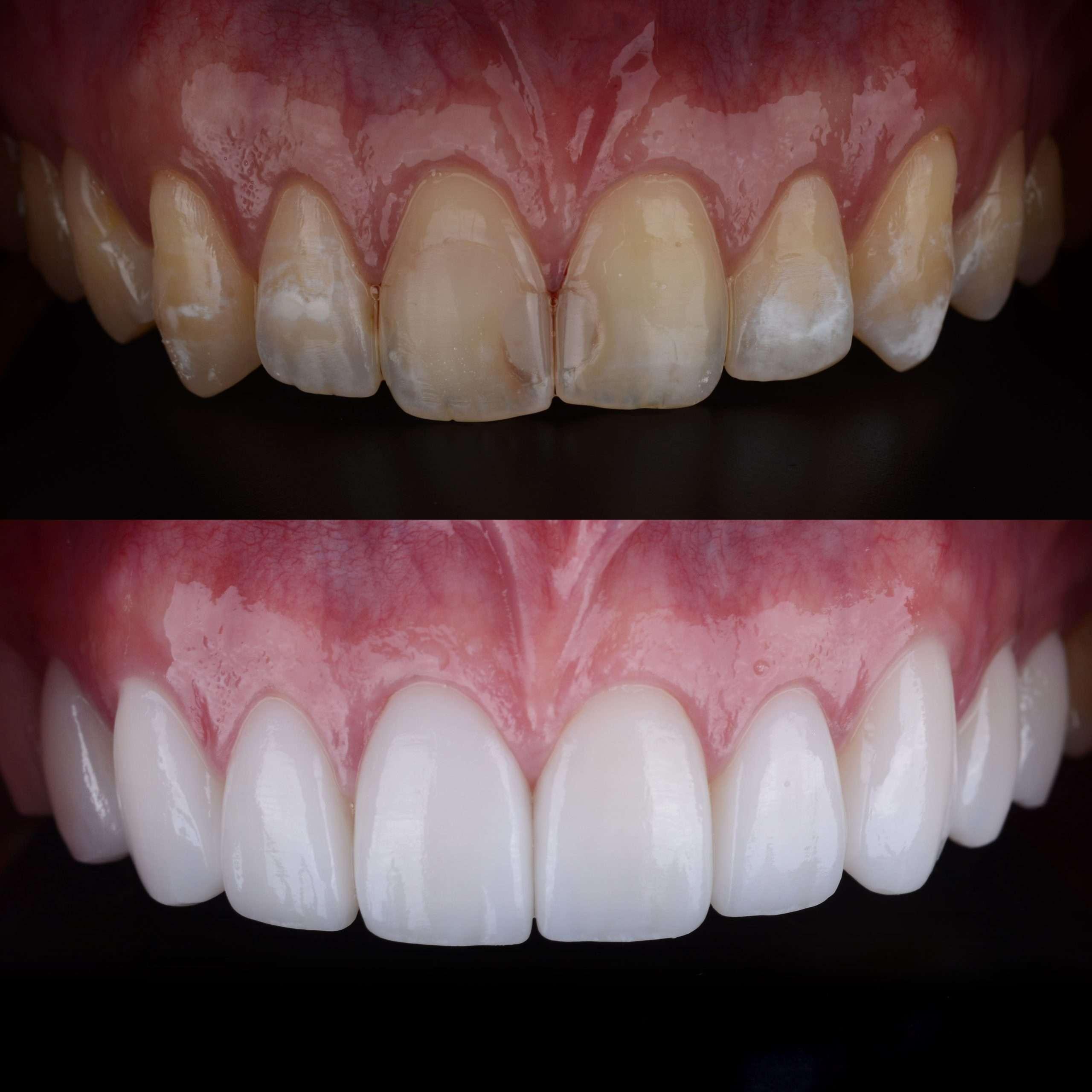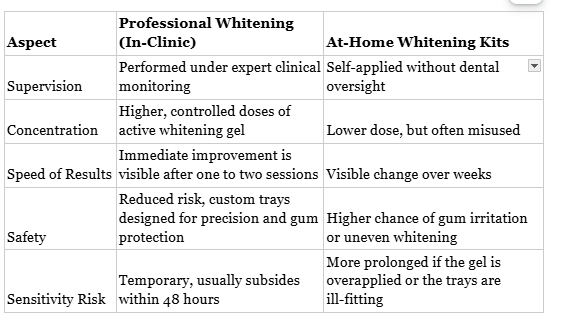Does Teeth Whitening Lead to Lasting Sensitivity?

Teeth whitening has become one of the most sought-after cosmetic dental treatments across the UK, with patients commonly looking for options that deliver a brighter, whiter smile in a short span of time. While the results can be transformative, many people worry about the possible link between whitening and long-term sensitivity. This concern often arises because whitening procedures—whether in-clinic or at-home—interact with the enamel and dentine, both of which can play a role in heightened tooth sensitivity.
If you are thinking about getting teeth whitening in Colchester, or if you have already undergone the procedure, it is important to understand how whitening affects your teeth, why sensitivity may occur, and whether those effects can persist. Below, we break down the science, the safety factors, and the steps you can take to safeguard your smile both now and in the future.
Understanding Tooth Sensitivity
Tooth sensitivity occurs when the protective enamel layer becomes worn down or thin, exposing the underlying dentine. Dentine contains numerous microscopic tubules that connect directly to the nerves inside the tooth. When these are exposed, triggers such as hot, cold, sweet, or acidic items can cause short bursts of pain.
Whitening agents, especially those containing hydrogen peroxide or carbamide peroxide, penetrate the enamel to break down stain molecules. While this process is generally considered safe under professional guidance, it can temporarily leave the tooth surface more permeable, which in turn may increase sensitivity.
It is worth noting that sensitivity is not the same for every patient. For example:
-
Some only feel slight discomfort for a day following teeth whitening Colchester,
-
Others may experience recurring sensitivity if they already had thin enamel or gum recession,
-
And a smaller group may require follow-up with an emergency dentist in Colchester if the discomfort escalates unexpectedly.
Does Whitening Cause Permanent Sensitivity?
One of the most common misconceptions is that whitening leads to permanent changes in sensitivity. Scientific studies generally show that whitening-related sensitivity is temporary, lasting from a few hours to a few days after treatment.
In most patients, once the peroxide gels have left the enamel and salts in saliva re-mineralise the surface, the sensitivity reduces to normal levels. Long-term effects are rare if the whitening procedure is carried out properly and supervised by a qualified dental professional.
Permanent sensitivity might only be linked to overuse of whitening gels at excessively high concentrations or continuous unsupervised bleaching. Home-use kits bought without dental supervision are particularly risky because incorrect application and overuse can damage enamel or irritate the gums significantly.
Factors That Increase the Risk of Sensitivity
Some people are far more prone to post-whitening sensitivity than others. The following factors can indicate a higher risk:
-
Gum recession exposing the roots
-
Worn or weakened enamel from grinding or acid erosion
-
Existing dental conditions, such as untreated cavities or cracked teeth
-
Use of overly strong whitening gels without dental monitoring
If you fall into any of these categories, it may not be advisable to whiten without prior examination and appropriate recommendations from a dentist. In some cases, your practitioner might suggest gentler options or limited sessions to reduce discomfort.
Professional Whitening vs At-Home Whitening
Here is a simple comparison of professional whitening carried out at a dental clinic versus typical at-home options:

When managed properly, teeth whitening in Colchester within a clinic setting is far less likely to cause lasting tooth sensitivity compared to purchasing generic whitening kits.
Practical Tips to Minimise Sensitivity
Patients often ask what they can do to ease or prevent sensitivity once they decide to whiten. Here are three effective steps that can make a difference:
-
Use a desensitising toothpaste for at least two weeks before and after whitening treatment.
-
Avoid consuming acidic or very hot and cold foods for 48 hours after whitening.
-
Apply fluoride gels or varnishes if recommended by your dentist to strengthen enamel.
These simple measures can greatly reduce discomfort and make whitening more comfortable overall. In some cases, your dentist may also suggest shorter, spaced-out whitening sessions rather than a single long procedure.

The Importance of Pre-Treatment Dental Assessment
Before any whitening treatment begins, a professional examination is essential. Not every patient is an ideal candidate for whitening, especially without prior treatment of existing conditions. If cracks, loose fillings, gum recession, or decayed areas are left unaddressed, peroxide-based gels can seep into sensitive areas of the teeth and make symptoms worse.
This is where the value of consulting an experienced practitioner becomes clear. In certain circumstances, a dentist may recommend repairing or restoring structural issues before bleaching. Skipping this stage increases the likelihood of sensitivity not only during whitening, but potentially in the long term.
If pain escalates to a level where eating or sleeping is impaired, booking an appointment with an emergency dentist in Colchester becomes an urgent priority. This ensures that the sensitivity does not mask a deeper issue, such as a cracked root, cavity, or infection.
How Long Will Sensitivity Last After Whitening?
For most people, sensitivity peaks within the first 24 to 48 hours after treatment. During this time, nerve endings inside the tooth remain highly responsive as a temporary reaction to peroxide agents. After 48 hours, most discomfort should begin to fade as the enamel re-mineralises and sensitivity returns to baseline.
However, if patients misuse whitening gels or go for back-to-back sessions without giving their teeth time to recover, lingering sensitivity may extend for several weeks. Such cases usually highlight the importance of spacing out treatments and following the dentist's instructions precisely.
When to Seek Professional Help
While some discomfort is expected, it is important to know the difference between normal and abnormal sensitivity. Monitor closely and consider seeking dental support if:
-
Pain lasts more than a week after whitening,
-
Sensitivity interferes with day-to-day activities like eating or drinking,
-
Gum tissue looks swollen, red, or blistered after whitening gel contact.
These symptoms could indicate irritation beyond mild sensitivity and warrant immediate examination from an emergency dentist in Colchester.
The Balance Between Aesthetics and Comfort
In the pursuit of a brighter smile, patients should not feel that sensitivity is a permanent sacrifice. With modern techniques and dentist-supervised procedures, whitening can be both safe and effective. The overall balance lies in selecting the right method, sticking to recommended treatment frequencies, and maintaining good oral hygiene between sessions.
Dental professionals are now able to tailor whitening treatments, using protective barriers, lower but repeated peroxide concentrations, or complementary desensitising products to maintain both cosmetic results and patient comfort. This dual focus ensures results without compromising tooth health.
Video Link : https://vimeo.com/1062386248/801185ba66?share=copy
Conclusion
Whitening can cause temporary sensitivity, but claims of permanent sensitivity are mostly overstated and rare when treatment is carried out correctly. Patients in Colchester interested in improving their smiles should always consult trained dental professionals for the safest outcomes. Remember to ask about protective measures, use supportive products like desensitising toothpaste, and monitor any symptoms that extend beyond normal recovery. At EDC, we provide every patient with evidence-based advice and treatments designed to protect long-term oral health while delivering cosmetic enhancement in a safe, sustainable way.
- Art
- Causes
- Crafts
- Dance
- Drinks
- Film
- Fitness
- Food
- Games
- Gardening
- Health
- Home
- Literature
- Music
- Networking
- Other
- Party
- Religion
- Shopping
- Sports
- Theater
- Wellness



